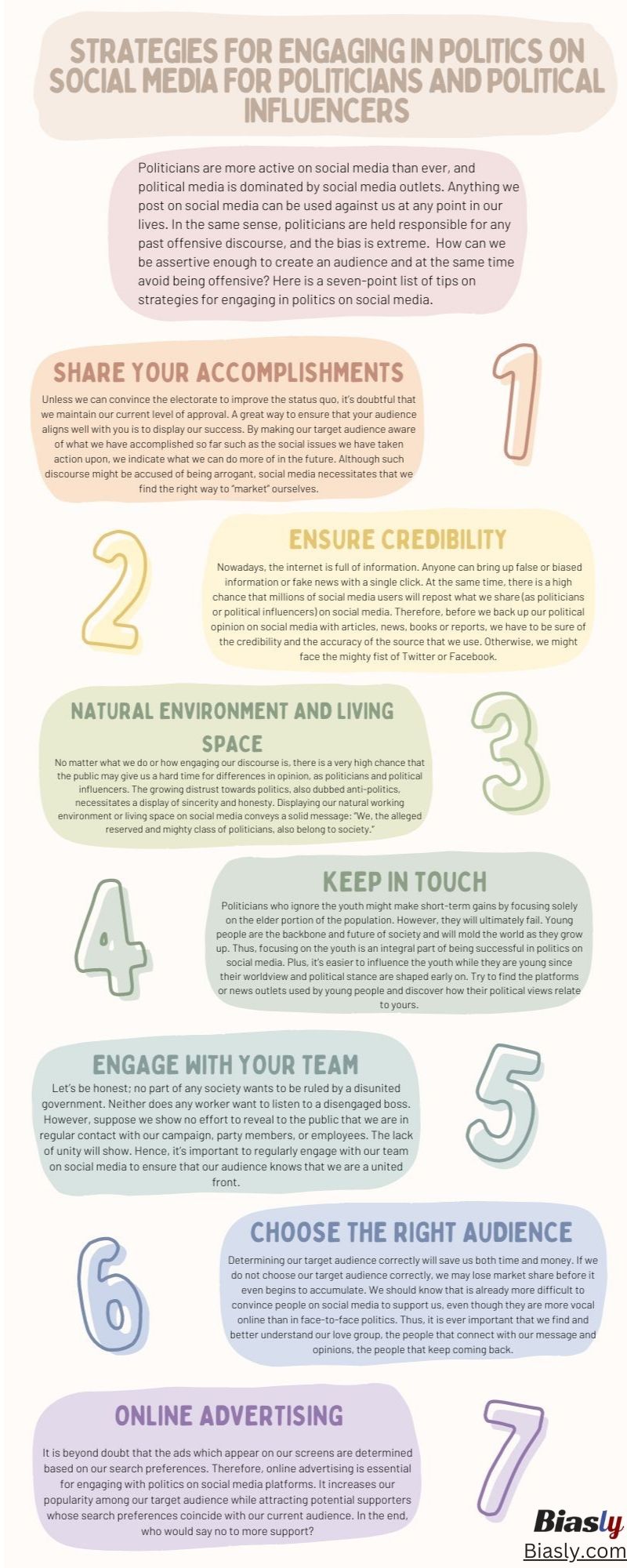
The 21st century has brought groundbreaking changes to politics via digitization, and there has never been a time in history when political influencers have had so much power. Politicians are more active on social media than ever, and political media is dominated by social media outlets. What we say is not exclusive to our circle of friends and family anymore. Anything we post on social media can be used against us at any point in our lives. In the same sense, politicians are held responsible for any past offensive discourse, and the bias is extreme. Dilemmas, as such, bring in the question of how to determine the alleged right way of engaging in politics on conventional media and social media platforms. How can we be assertive enough to create an audience and at the same time avoid being offensive? Here is a seven-point list of tips on strategies for engaging in politics on social media.
1. Share your accomplishments
Unless we can convince the electorate to improve the status quo, it’s doubtful that we maintain our current level of approval. A great way to ensure that your audience aligns well with you is to display our success. By making our target audience aware of what we have accomplished so far such as the social issues we have taken action upon, we indicate what we can do more of in the future. Unfortunately, humility will not bring us much approval in today’s highly digitalized world. It is highly unrealistic to expect our voice to be heard among the millions on social media. Although such discourse might be accused of being arrogant, social media necessitates that we find the right way to “market” ourselves.
2. Ensure credibility
Isn’t the internet beautiful? However, how long would it take to measure the credibility of data if we lived in 1921 instead of 2021? And how accurately would we be able to determine its accuracy? Nowadays, the internet is full of information. Anyone can bring up false or biased information or fake news with a single click. At the same time, there is a high chance that millions of social media users will repost what we share (as politicians or political influencers) on social media. Therefore, before we back up our political opinion on social media with articles, news, books or reports, we have to be sure of the credibility and the accuracy of the source that we use. Otherwise, we might face the mighty fist of Twitter or Facebook.
3. Show your natural environment and living space
Anti-politics have become very prevalent in the 21st century due to distrust towards conventional political organizations. No matter what we do or how engaging our discourse is, there is a very high chance that the public may give us a hard time for differences in opinion, as politicians and political influencers. The growing distrust towards politics, also dubbed anti-politics, necessitates a display of sincerity and honesty. Displaying our natural working environment or living space on social media conveys a solid message: “We, the alleged reserved and mighty class of politicians, also belong to society.” What are some effective ways of sharing with our followers to show that we are like them?
- Instead of writing a series of dull tweets, we can do live streams from our home or office
- We can engage with analogies and personal information that relate to our opinions
- We can spend time with them and show photos on social media
4. Keep in touch with young people
Ask yourself: why does every party in the world have a youth wing? Politicians who ignore the youth might make short-term gains by focusing solely on the elder portion of the population. However, they will ultimately fail. Young people are the backbone and future of society and will mold the world as they grow up. Thus, focusing on the youth is an integral part of being successful in politics on social media. Plus, it’s easier to influence the youth while they are young since their worldview and political stance are shaped early on. Try to find the platforms or news outlets used by young people and discover how their political views relate to yours.
5. Engage with your team members
Let’s be honest; no part of any society wants to be ruled by a disunited government. Neither does any worker want to listen to a disengaged boss. However, suppose we show no effort to reveal to the public that we are in regular contact with our campaign, party members, or employees. The lack of unity will show. Hence, it’s important to regularly engage with our team on social media to ensure that our audience knows that we are a united front.
6. Choose the right target audience
Getting the right target audience is crucial to success. How likely is it that a gun enthusiast will support green politics? Is it worthy for the green party to spend countless hours convincing hunters to vote for them? Determining our target audience correctly will save us both time and money. If we do not choose our target audience correctly, we may lose market share before it even begins to accumulate.
We should know that is already more difficult to convince people on social media to support us, even though they are more vocal online than in face-to-face politics. Thus, it is ever important that we find and better understand our love group, the people that connect with our message and opinions, the people that keep coming back. Political influencers and politicians should develop strategies that would provide the most benefit to these groups long term. In the end, it’s not rocket science to predict who will follow or vote for us.
7. Online advertising
It is beyond doubt that the ads which appear on our screens are determined based on our search preferences. Therefore, online advertising is essential for engaging with politics on social media platforms. It increases our popularity among our target audience while attracting potential supporters whose search preferences coincide with our current audience. In the end, who would say no to more support?























